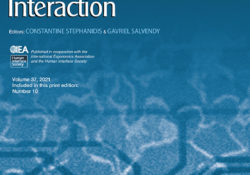eric.ed.gov har udgivet: Project SUCCESS sought to recruit, train, and support paraprofessionals and mid-career adults in high-need teaching fields (math, science, special education, bilingual) in transitioning to teach in high-need schools. A 27-minute video was produced to supplement reporting of project evaluation outcomes. This paper highlights procedures and recommendations for production of video to report evaluation outcomes. Email video invitation is appended. Link til kilde
Like this:
Like Loading...
tandfonline.com har udgivet en rapport under søgningen “Teacher Education Mathematics”: ABSTRACT Formulae display:?Mathematical formulae have been encoded as MathML and are displayed in this HTML version using MathJax in order to improve their display. Uncheck the box to turn MathJax off. This feature requires Javascript. Click on a formula to zoom. ABSTRACT Physical closure of educational institutes worldwide due to the COVID-19 pandemic has resulted in the emergence of a new era of video-based learning. The current circumstances are unique that have forced students to use digital technologies for their learning purpose. However, the successful usage of such a system relies on the understanding of the adoption factors, for which an integrated model is proposed based on the Technology Acceptance Model and the Task Technology Fit Model. Additionally, this work… Continue Reading →
Like this:
Like Loading...
eric.ed.gov har udgivet: Homes have remarkable possibilities to act as science learning environments for young children (3 – 6 years old). This qualitative case study investigated what kind of support parents need to do online science activities with their children at home. Data consisted of parent’s theme interviews (n=7). As a main result, a model of parents’ need for support was produced. The model contains three dimensions: 1) the affective dimension, 2) the knowledge and skills dimension and 3) the organizational dimension. Parents’ own affective experiences, organization of the experiments and finding time to do experiments are important factors to consider, when looking at parents’ willingness to engage in science activities with their children. The parents might not necessarily be content with only the child’s interest in experimenting as a… Continue Reading →
Like this:
Like Loading...
